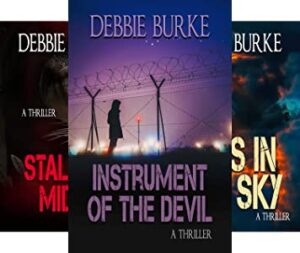
Photo credit: Photo by Dylan Gillis on Unsplash
by Debbie Burke
@burke_writer
Recently Jim Bell suggested I write a post about critique groups. Thanks for the idea, Jim!
What should a new writer look for?
New writers need three things:
- Accountability – A critique group motivates you to write consistently. It’s human nature that you’re more apt to meet someone else’s deadline than one you impose on yourself. A frequent comment: “If I didn’t have to turn in pages for my critique group, I wouldn’t have gotten around to writing.”
- Readers – Unless you’re keeping a journal only for yourself, you eventually want others to see your work. Critique groups are good first readers for a new writer.
- Feedback – The most important job of a critique group is to improve your writing. They spot trouble areas, inconsistencies, lack of clarity. The writer is often too close to the work to see problems. Critique groups offer objectivity. They make suggestions such as how to strengthen prose, what parts to cut or expand, ways to make characters come to life, etc.
When I was starting out, critique groups filled all three needs for me. Thirty-five years later, I’m pretty good about #1 (accountability) but I still need #2 and 3, readers and feedback. Currently I participate in two groups, one with long-time author friends, the other on Zoom with writers scattered around the country I’ve never met in person.
“But I’m not a joiner.” If you can effectively work alone, that’s great. But consider a critique group or beta readers for feedback before submitting for publication.
How to find a critique group:
- Take writing classes – My first group grew out of students I met at creative writing classes at the community college.
- Join a writing organization – Check out this list. Some are generalized with a broad interest range that includes fiction, nonfiction, poetry, screenwriting, journalism, memoirs, etc. Other groups focus on specific genres like romance, mystery, historical, children’s, Christian, etc. Most organizations offer active programs to help you meet other writers in your area of interest.
- Attend a conference – Critique groups sometimes form among attendees.
- Ask local bookstores and libraries – They frequently serve as meeting places for critique groups.
- Search online – Meetup.com, Google, social media, etc.
How to set up a new group:
- Gather six to eight other writers. That’s enough to give a variety of viewpoints. More than that, it’s difficult to review everyone’s submission in a timely way. If possible, find writers with more experience than yourself who are willing to help those with less experience.
- Decide how often to meet–weekly, bi-weekly, monthly.
- Find a convenient location, such as members’ homes, coffeeshops, bookstores, the library, etc.
- Meet remotely via Zoom, Facetime, etc.
- Agree on rules. Basic guidelines are: be respectful, courteous, helpful; don’t interrupt and don’t be snarky.
Join an existing group:
Some groups are open to newcomers. Others are by invitation only. You may need to submit a writing sample, or be recommended by someone already in the group.
Two common formats:
- Read pages aloud to the group. This takes time and limits the number of submissions that can be reviewed. But it also helps newer writers hear problems they don’t see on the page.
- Submit pages in advance, then discuss at the meeting.
Generally, the author remains silent during discussion. Afterwards, they may ask questions or comment.
Authors frequently want to defend their work or explain what they really meant, which is not necessarily what is actually written on the page/screen. Remember, when the story is published, the author isn’t there to explain. The writing must stand on its own.
Is this the right group for me?
- Trial run – Ask if you can attend a couple of meetings (in person or by Zoom) to get to know other members. You can tell a lot by how respectfully they treat each other. Strong suggestion to newcomers: listen more than talk.
- Compatible chemistry – Can you work with these people? Can they work with you? A group that writes gritty noir is not useful for a children’s picture book author.
- Tone – Lively discussions are not the same as pointless arguments.
- Attitude – Are they helpful and encouraging? Do they actively look for solutions to problems? Do authors go home excited and energized?

Image by OpenClipart-Vectors from Pixabay
Danger Signs to Watch For:
- Poisoners – Some groups are just plain toxic. They exist to savage someone else’s writing to make themselves feel superior. Avoid such people at all costs. They never help and destroy your enthusiasm and confidence.
- Divine Emperor – Someone appoints themselves the ruler of the group, delivering proclamations straight from Mount Sinai. When you’re not experienced, it’s easy to be intimidated by those who know more than you do. But what often masquerades as “knowledge” are simply arbitrary rules.
- Monopolizer – This person demands attention. Drop everything right now and focus on my story because the world really does revolve around me. All take and no give doesn’t work in critique.
- Closed Ears – This writer won’t listen to suggestions. S/he repeats the same problems month after month.
- Frustrated Actor – This writer wants applause from an audience. S/he wants affirmation, not constructive criticism.
What Are Potential Problems?
- In groups of new writers, sometimes the ignorant are leading the uninformed. Educate yourself by reading craft books and articles and taking classes. Expand your knowledge at the same time you practice writing.
- Personality clashes may arise. Try talking one on one to work out your differences outside regular meetings. Maybe you can agree to disagree and keep discussion civil. If you can’t, one of you might have to find a different group.
- Lack of participation. Some people rarely submit and offer lots of excuses. They’d rather talk about writing than write. Some submit and accept feedback, but don’t comment on others’ submissions. A group only works with active give and take.
Here are a few additional thoughts from one of my early guest posts for TKZ.
I’m a big fan of critique groups because the ones I’ve been in included good people who are eager to learn and are glad to help others. YMMV. If you had a bad experience in the past, consider trying again with different people.
We all start out as beginners. Learning to write is intimidating. Sharing what you write with other can be scary.
But it can also lead you to rewards you never imagined.
~~~
TKZers: Are you in a critique group? What helps you? What causes problems?
~~~

Critique groups contributed invaluable help to every book in Debbie Burke’s Tawny Lindholm Thriller series. Available here.



